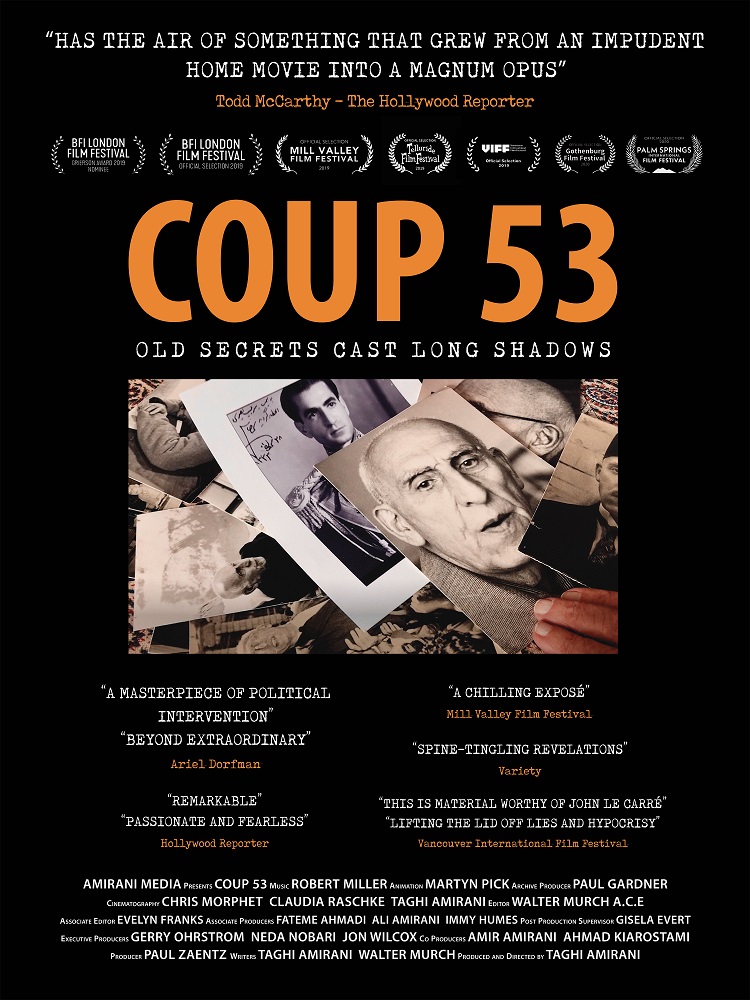
Written by Ram Venkat Srikar
The facet of documentary filmmaking that excites me most is the aftermath of the release. Documentaries affect the real world and real people; wider the subject matter, wider the impact. On this premise, I’m certain that Coup 53 will have a profound impact on an entire generation of Iran, offering a bit of closure to some, and furthers the existing material pertaining to the Iranian coup d’état, while also instigating a sense of treachery they’ve been subjected to 67 years ago. More importantly, the film factually addresses the major role of the USA and Britain in operation Ajax, whose involvement the latter has refrained from acknowledging. That’s a lot to chew on, with enough material for a 10-part documentary series, but Taghi Amirani’s film manages to condense the overabundance of material into a two-hour runtime, which assures that the intrigue remains intact thoroughly.
In the making for over eight years, Coup 53 chronicles Taghi Amirani’s journey as he sets out to make a film to prove the involvement of Britain and the USA in the 1953 Iranian coup d’état that resulted in the overthrowing of the nation’s first democratically elected prime minister, Mohammad Mosaddegh. Amirani shapes along with editor Walter Murch (best known for The Godfather trilogy and Apocalypse Now) in a way that allows us to behold the vastness and intricacy of the operation Ajax 67 years ago, while gradually transpiring facts in the present. Boiling down a subject matter that spans over six decades into a two-hour film, yet lucidly expounding it proves that documentaries are written at the editing table. It’s fair that Murch shares the writing credit with Amirani. The process of decoding the massive conspiracy not only bestows a nail-biting political thriller, but also nudges that this what good journalism should stand for.
The structure of the film is analogous to a transcription document Amirani discovers that has parts of conversation literally cut out of the paper. The film digs out the missing parts and pieces the conversation together, thus filing the blank spaces of the factual documentation. If the document with missing parts is history, this documentary is the missing piece that gives completion to history. The analogy is meta and so is the film. Amirani uses the film to further the film; seeking leads when he hits a roadblock, he shows the film he’s shot till that point to further his search for answers. When Amirani gets access to the rushes of End of Empire, a 1985 documentary chronicling the end of British colonialism, it becomes the foundation of the film, while also raising questions regarding a person’s identity. It’s enthralling how the film becomes a mystery at a point as the filmmaker cannot get hold of an MI6 agent, Norman Darbyshire, who played a crucial role in the coup. As actor Ralph Fiennes comes onboard to read transcripts of Darbyshire, the film borrows from and invigorates End of Empire, making it more cohesive.
Although the film is about one operation, it builds towards the coup covering numerous existing predicaments from Iranian, British, and American perspectives. The massive difference between British and Iranian standards of living in the ’40s is addressed, the importance of oil in enhancing Iranian lives is stipulated, Theodore Roosevelt is not spared as well, and it is propounded that Winston Churchill answered the Iranians the same way he did Nazis. These teeny-tiny details cumulatively address the high political incorrectness of the times.
Regardless of how much I try to explicate the film, it’ll be far from the depth it offers. In addition to filling the staggering lulls in history, it acts as a critique of the dirty political regime the prevailed in the early ’50s, trying to assess what Iran ‘could have been’ if not for the coup and had democracy sustained. Beyond the thousands of documents, hours of raw footage, and interviews, Amirani looks at the coup as an operation that disrupted the course of his nation and his destiny. The film is as much about bringing duplicitous politics to light, as much it is about a man holding two gargantuan powers accountable for altering his life. And what a win it is! Coup 53 proves that regardless of how arid the subject matter may appear cinematically, when made with expertise, a film can succeed both on the cinematic and political fronts.